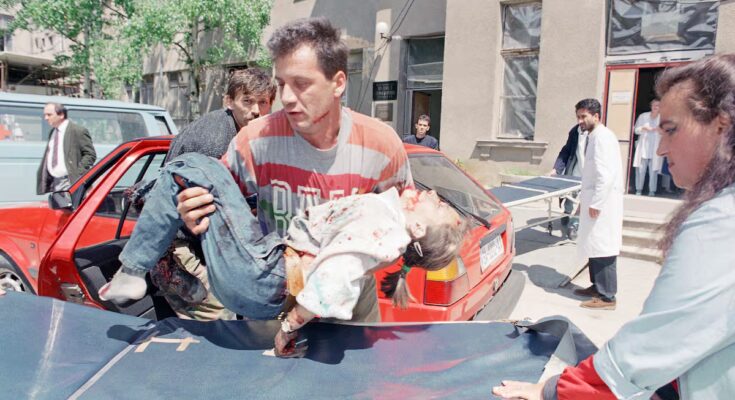The Milan Prosecutor’s Office is moving to find out more about the alleged “human safaris” in Sarajevo, reported in Italy by a writer and two important lawyers expert in complex cases. It is suspected that during the Bosnian War in the 1990s, some Italians paid to travel to Sarajevo and shoot civilians from hills controlled by Bosnian Serb militias.
“We have presented documentation full of evidence that deserves further investigation, which we have suggested to the court. We firmly believe that it can lead to the identification of at least some of those responsible for these horrendous crimes,” lawyer Nicola Brigida told EL PAÍS in a telephone conversation. He hopes the name of at least one suspect will eventually emerge, which could speed up the investigation.
New details emerged on Wednesday about one of the key sources cited in the complaint, a former Bosnian intelligence agent who is expected to be one of the key witnesses and will be called to testify. The former agent claims that in 1993 they informed the Italian secret service, then known as Sismi, of the existence of these organized trips.
“They responded two or three months later: ‘We found out that the safari starts from Trieste. We stopped it and there will be no more safaris,'” the former agent said in his testimony, as reported by Italian media.
The journey of these so-called “war tourists” began with a flight from Trieste, the Italian city near the Slovenian border, to Belgrade, and from there they traveled by road to Sarajevo.
After that nothing more was heard about the matter. “We have not received the names of the hunters or the organizers from SISMI; there should be a SISMI document attesting to this”, notes the source.
In other words, there may be confidential information on the subject in the Italian state archives. This raises a crucial question: why was no action taken against these individuals at the time? One of the formal requests to the Milan Prosecutor’s Office is precisely to verify whether Italy is still in possession of a copy of that documentation.
Brigida, who prefers not to provide further details on the case to allow investigators to work, is one of the lawyers who drafted the complaint presented in July to the Milan Prosecutor’s Office, which became public this week. He did it together with the former magistrate Guido Salvini, using the material collected by the journalist and writer Ezio Gavazzeni, who has been investigating the issue for years and subsequently asked for their legal advice.
Brigida has extensive experience in managing highly complex cases involving missing Italians in Chile and Argentina. In particular, he participated in the trials against Admiral Emilio Massera and generals Suárez Mason and José Antonio Rivera of the Argentine military junta, key figures during the dictatorship (1976-1983). And he worked on cases involving Oscar Alfonso Podlech Michaud, a senior official in the Pinochet dictatorship in Chile. He was also involved in cases involving victims of Operation Condor, the coordinated campaign of repression waged against South American dictatorships in the 1970s and 1980s, and attacks during Italy’s Years of Lead, such as the 1980 Bologna train station bombing.
The other lawyer, Guido Salvini, is a respected former magistrate, now practicing law, who has in the past investigated dark and highly secretive networks, including Italian neo-fascist terrorism and the secret military network Gladio.
Considering the cases he has dealt with throughout his career, Brigida admits that it is difficult for him to be surprised: “This story surprised me to a certain extent: after having dealt with things like the death flights (in Argentina), nothing surprises me anymore.” He emphasizes that the group in question is “a group of criminals” with a common profile: “Evil people, perhaps even ideologically motivated, passionate about weapons, who frequented shooting ranges.”
The two lawyers join in this difficult battle for the truth, which began with the presentation of a 17-page complaint to the Milan Prosecutor’s Office, which outlines a series of leads, clues and potential witnesses to be questioned, chains that the public prosecutor Alessandro Gobbis, now in charge of the case, will be able to follow.
“Evidently our report was considered well-founded and serious, and deserved to be verified and investigated. The Milan Prosecutor’s Office opened an investigation, which it delegated to the anti-terrorism section of the ROS (Special Operational Group, Carabinieri unit specialized in terrorism)”, explains the lawyer.
“It was universally known”
This news caused a sensation in Italy, but Italian writer and activist Adriano Sofri – who was in Sarajevo during the Bosnian war and sent reports to Italian newspapers – published an article on Wednesday claiming that the practice was “universally known”. Furthermore, he says that the participants in this macabre activity were “enthusiastic and numerous”. In his article I reproduced excerpts from his writings from the period in which he talks about it, such as this one from May 17, 1995:
“In Grbavica, where Chetnik snipers (the ultra-nationalist Serbian militia) and international participation in the hunt are not hidden – indeed, they are flaunted on (Radovan) Karadžić’s television – even when the target is children (smaller target, greater success for those who shoot), there is also a Greek group and the notable case of a Japanese volunteer”.
Sofri recalls that the Japanese volunteer explained on Bosnian Serb television that he came to film in Sarajevo “because of a broken heart.” In the same article, Sofri claimed that one of the people who came to shoot civilians was the Serbian ultranationalist Vojislav Šešelj, who killed a passerby in front of the cameras.
The Italian Prosecutor General’s Office, Brigida notes, is also obtaining the files of various proceedings from the International Criminal Tribunal (ICTY) in The Hague for crimes committed in the former Yugoslavia in recent decades. Some witness statements in those trials refer to these so-called war tourists. The former mayor of Sarajevo, Benjamina Karić, in office from 2021 to 2024, also sent a formal communication to the Milan court providing the information in her possession.
The case is still open, explains Brigida, because it is a very serious crime punishable by life imprisonment, which in Italy is never subject to a statute of limitations. “The penal code provides that even if the final stage of these crimes is committed in another country, Italian jurisdiction is maintained and the trial can take place in Italy. Otherwise, a citizen could go abroad, commit horrible crimes and then seek refuge in Italy with impunity,” he said.
Sign up to our weekly newsletter to get more English-language news coverage from EL PAÍS USA Edition



